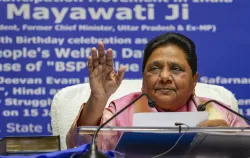Indian Overseas Congress Chairman Sam Pitroda's remarks on ‘inheritance tax’ have sparked a huge row in the political sphere. After PM Narendra Modi and the other party leaders reacted to the well-said 'controversial' statement, Bahujan Samaj Party (BSP) President and former Uttar Pradesh chief minister Mayawati also came down heavily on the Congress Party.
Taking to X (formerly Twitter), the former Uttar Pradesh chief minister said the idea and advocacy for inheritance tax by the senior Congress leader is a politically motivated move and does not mean for the welfare of the poor.
She said, "The idea and advocacy of 'inheritance tax' on private property, like in the US, under the guise of distribution of wealth in India by senior Congress leaders seems less for the welfare of the poor and more like a politically motivated electoral effort to divert people's attention from the well-known failure of their 'Garibi Hatao' campaign."
Speaking further, the BSP President criticized Congress, saying that it is difficult for them to get rid of the tainted legacy.
"As far as the question of justice for Dalits and deprived people in matters related to property and government land distribution, etc., is concerned, poverty, backwardness, compulsion to migrate, etc. could not be eradicated due to the lack of right intentions of these governments. It is difficult for Congress to get rid of such a tainted legacy," she further added.
Meanwhile, Indian Overseas Congress chairman Sam Pitroda, in the midst of the Lok Sabha Elections 2024, earlier stoked controversy after he advocated for the United States-like inheritance tax in India and backed Congress' stand on wealth redistribution plans.
Explaining the inheritance tax regime followed in the US, Sam Pitroda has said that there is an inheritance tax according to which the US government is entitled to claim a 55 percent share of a person's wealth while the owner can transfer only a 45 percent share to his children or family.
"In America, there is an inheritance tax. If one has $100 million worth of wealth and, when he dies, can only transfer probably 45 percent of it to his children, 55 percent is grabbed by the government. That's an interesting law. It says you, in your generation, made wealth and you are leaving now; you must leave your wealth for the public—not all of it, but half of it, which to me sounds fair. In India, you don't have that. If somebody is worth 10 billion and he dies, his children get 10 billion, and the public gets nothing... So these are the kinds of issues people will have to debate and discuss," Sam Pitroda said.
"I don't know what the conclusion would be at the end of the day, but when we talk about redistributing wealth, we are talking about new policies and new programs that are in the interest of the people and not in the interest of the super-rich only," the chairman of the Indian Overseas Congress added.

